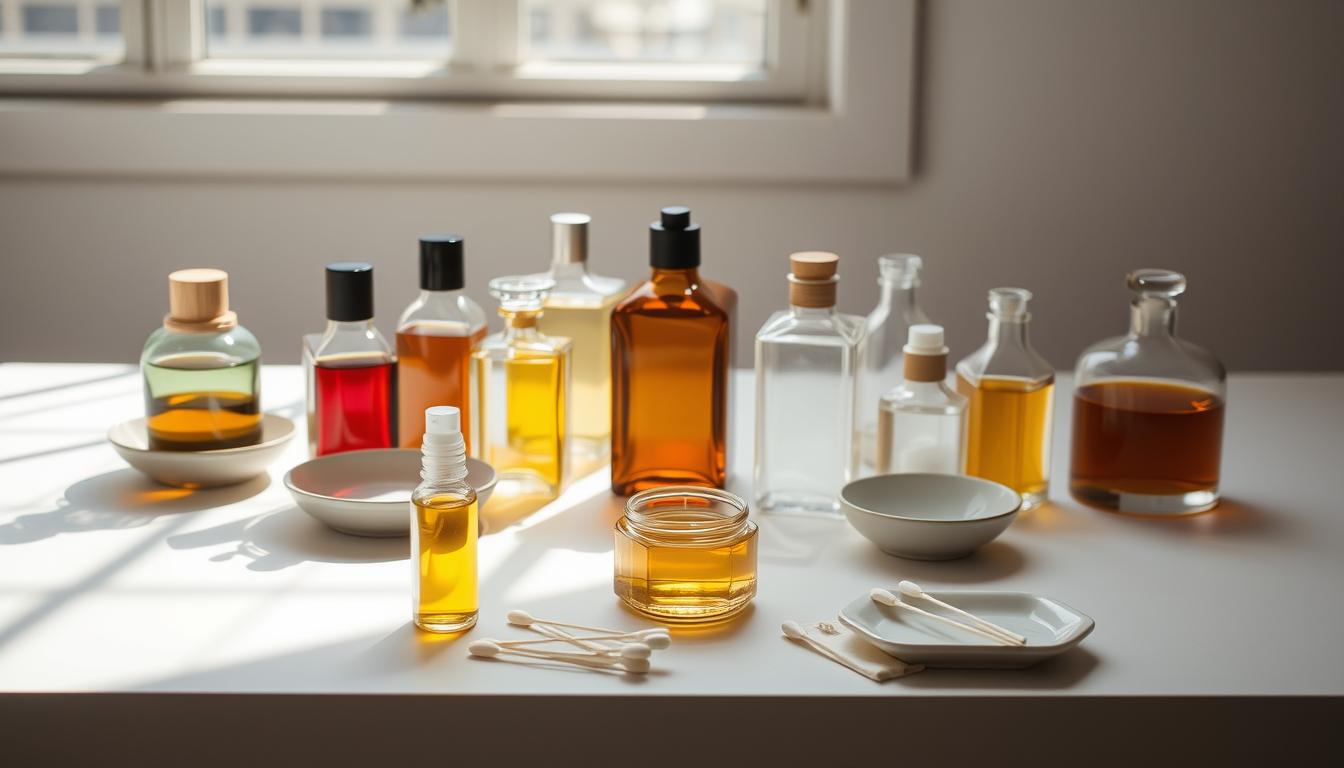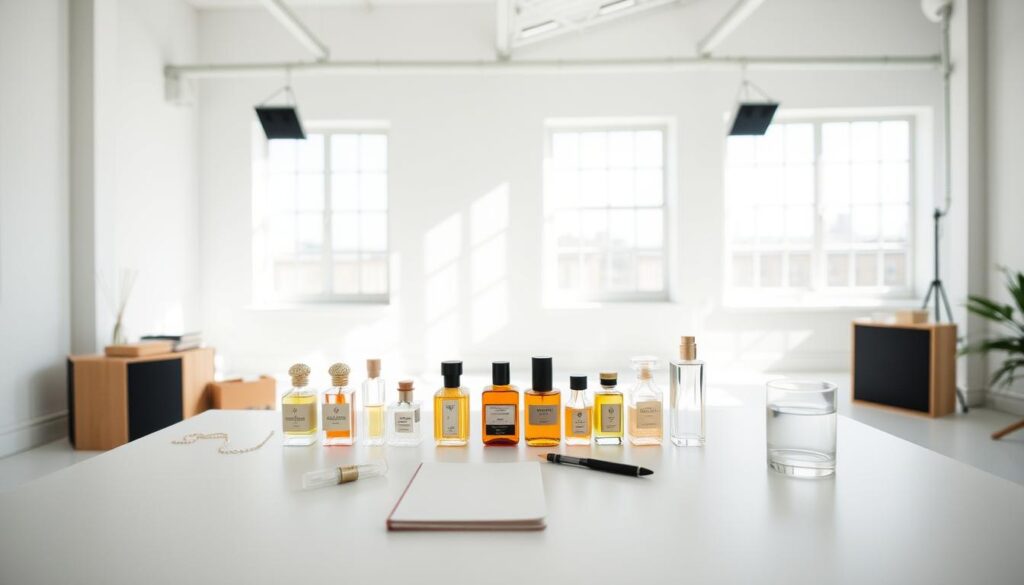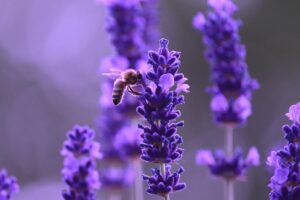A few years ago, I went to a luxury fragrance boutique to find my new scent. I spritzed sample after sample, excited to explore. But by the fifth fragrance, everything started to blend together. Vanilla, citrus, wood—everything smelled the same. I’d hit “nose fatigue perfume.” It felt like I’d lost a sense, and I wasn’t alone.
Researchers like from the Monell Chemical Senses Center explain this is olfactory fatigue: repeated exposure numbs our smell receptors.
That day taught me why learning how to test perfumes is important. Nose blindness isn’t just a minor issue—it’s a real phenomenon where your brain ignores familiar scents. But there’s hope. By understanding how to avoid nose blindness, you can explore fragrances without losing your sense of smell. This guide shares tricks like strategic breaks, scent resets, and smart testing routines to keep your senses sharp.
Key Takeaways
- Repetitive scent exposure causes olfactory fatigue, making it hard to distinguish smells.
- Breaking tests into short intervals helps maintain sensitivity when learning how to test perfumes.
- Airflow and neutral spaces reduce nose fatigue perfume effects during sampling.
- Alternate between light and bold scents to prevent sensory overload.
- Scientific insights from studies by experts like inform proven techniques.
Getting Started with Perfume Testing
Learning to test perfumes is easy. Just prepare a few things first. These steps help keep your senses sharp as you try new scents. Follow these tips to get the most out of each sniff.
Preparing Your Senses
First, clean your palate. Think of your nose as a crowded room. Clear it of smells before you start. Here are some perfume-testing tips to help:
- Drink plain water to clean your mouth’s taste receptors.
- Avoid spicy or strong-tasting foods before testing.
- Sniff coffee grounds or lemon peel to refresh your nose.
Setting the Right Environment
Choose a quiet, well-ventilated area. How to smell multiple fragrances without getting confused? Find a place with no distractions. A room with indirect sunlight and open windows is ideal.
A Parisian perfumer once said, “Store unscented tissues nearby to blot scents and prevent overlap.” Use a fragrance shopping guide approach. Note down your impressions in a notebook to track your reactions.
Remember, patience is important. Rushing through samples can confuse you. Take breaks and trust your instincts. Your senses will appreciate it!
Understanding Olfactory Fatigue
Olfactory fatigue is when your nose stops noticing a smell after being exposed to it for a long time. This natural process can make it hard to recognize even your favorite scents. Let’s explore why it happens and how to overcome it.
What is Olfactory Fatigue?
Your nose acts like a tiny messenger system. When you smell something, special cells send signals to your brain. But after a while, these cells get tired and stop sending messages. This is olfactory fatigue, making familiar smells seem to disappear. Even your morning coffee might become hard to notice after a few sips.
Common Causes of Scent Desensitization
- Work environments: Florists or perfumers face daily exposure to intense aromas.
- Personal habits: Wearing the same perfume daily can dull your perception over time.
- Rapid testing: Sniffing too many perfumes in quick succession overwhelms your receptors.
Resetting your nose is easy. Just take a break between scent tests or try something new like coffee grounds or lemon. Knowing how to smell perfume correctly means giving your senses time to rest between sprays. Taking small breaks and making smart choices keeps your nose sharp, even during long fragrance adventures.
Proper Techniques for Smelling Fragrances
Learning the best way to test perfumes lets you enjoy each scent fully. Begin with scent strips—small paper pieces that soak up fragrance. This way, you can smell each scent clearly without mixing them on your skin.
- Put a tiny bit of perfume on a clean strip, then wait 30 seconds before smelling it.
- Start with the top notes, then the middle, and finally the base notes as they unfold.
- Take breaks of 5-10 minutes between smells to clear your nose.
When exploring perfume sampling tips, find a quiet, neutral place. Scents like coffee or cleaning products can mess with how you smell things. I switch between light and strong scents to keep my sense of smell sharp. For instance, after a heavy scent, I try a citrus or floral one to refresh my nose.
Consistency is key. Don’t rub the strips together or hold them too close to your nose. This makes the scent too strong. By following these steps, you’ll keep your sense of smell sharp and enjoy perfumes as they’re meant to be.
Effective Methods on how to avoid nose blindness
To avoid how to not go nose blind, start with small breaks. Resetting your senses is crucial for new scents. Here are simple strategies that work without needing a science degree.
Resetting Your Nose Sensitivity
My best perfume tester tips include using sensory reset triggers. Try sniffing a coffee bean grinder or a lemon slice. Also, fresh linen or unscented paper can help. These tricks clear your nasal receptors and prevent what is nose blind.
Step-by-Step Technique Breakdown
- Pause and Breathe: Take 20-second breaks between spritzes. Inhale deeply through your nose, then exhale through your mouth to flush out lingering scents.
- Use Reset Scents: Keep a jar of crushed coffee beans or a citrus wedge nearby. A quick sniff reboots your nose’s sensitivity.
- Alternate Testing Zones: Switch between wrists, neck, and even a clean card. Different surfaces slow scent adaptation.
These methods aren’t just theories—I’ve tested them all. Combining breaks with sensory resets keeps my nose sharp for hours. It’s all about balancing exploration with mindful pauses.
Tips for Testing Multiple Perfumes in One Session
“Taking breaks keeps your nose sharp when exploring new scents.”
Testing many perfumes at once doesn’t have to be overwhelming. Here are some tips to help you smell more without getting tired. They also keep your senses sharp.
Pacing Your Fragrance Sampling
Make sure to give your nose time to recover between samples. Try these steps:
- Pause 5–7 minutes between tests. I reset by breathing deeply or stepping outside for air.
- Alternate between fresh and strong scents to avoid sensory overload.
- Wipe wrists with alcohol-free sanitizer before each test to eliminate residue.
Alternate Testing Techniques
Switch methods to stay focused:
- Use scent strips instead of direct application—they reduce skin absorption and let you compare quickly.
- Sniff unscented coffee beans between tests. This neutralizes lingering aromas, per sensory research.
- Test in a quiet room. Silence helps you notice subtle notes without distraction.
My routine? Test three perfumes, then pause for a 10-minute walk. Using strips helps avoid fatigue. Science shows that spacing out samples keeps your brain alert. Now, you can explore dozens of scents without losing your sense of freshness!
Smelling Perfumes without Sensory Overload
Exploring perfumes can quickly overwhelm your senses. To avoid this, I use simple methods to keep my nose fresh. The ways to combat nose blindness include mindful pacing and strategic breaks. These techniques to prevent smell desensitization help maintain sensitivity during testing.
- Rotate scents every 10-15 minutes to reset your nose.
- Sniff fresh coffee grounds or citrus between sprays to cleanse your palate.
- Take 5-minute breaks in a scent-free area to recharge your senses.
| Technique | How to Do It | Benefits |
|---|---|---|
| Scent Rotation | Switch fragrances regularly | Prevents fatigue |
| Cleansing Pause | Use coffee or water | Resets olfactory nerves |
| Breaks | Step away for a few minutes | Maintains sensitivity |
By combining these strategies, I’ve found my testing sessions more enjoyable and productive. Small adjustments make all the difference in keeping my nose sharp and ready for discovery. Regular pauses and scent resets turn a chaotic spray session into a focused sensory adventure.
Strategies for Preserving Your Sense of Smell
Keeping your sense of smell sharp needs regular care. Simple steps like switching up fragrances and keeping things clean can help. These strategies to maintain sensitivity to scents include daily habits and smart choices to keep your nose on point.
Lifestyle Adjustments
Begin with these easy changes:
- Make sure your workspace and home don’t have strong smells to avoid nasal fatigue.
- Take short breaks, about 5 minutes, between trying different scents to refresh your nose.
- Use air purifiers to cut down on pollutants in the air that can make smells less clear.
Scent Neutralization Approaches
Try these methods to get rid of lingering smells:
| Method | Benefit |
|---|---|
| Essential oil blends | Refreshes receptors between scent tests |
| Steam inhalations | Clear nasal passages to enhance detection |
I’ve found that using peppermint steam treatments helps me after long perfume sessions. Experts suggest changing scents every 20 minutes to avoid overloading your receptors. If you notice your sense of smell isn’t as sharp, see a doctor or check out Pura’s guide on dealing with nasal problems.
Using Perfume Testing as an Art Form
Seeing perfume testing as an art form is more than avoiding nose blindness. It’s about making each test a journey for your senses. By mixing creativity with careful steps, I’ve found ways to keep my sense of smell sharp and enjoy fragrances fully.
- Take breaks between sprays, like a painter steps back to see their work. This pause helps avoid too much sensory input and keeps your nose fresh.
- Order fragrances in a sequence, like composing a song. This method helps me pick out different notes and keep my sense of smell sharp.
- Write down scent impressions in a journal. Recording my thoughts makes testing a mindful ritual, turning each spray into a creative act.
Being creative in my routine has changed how I test fragrances. When I see each scent as a blank canvas, testing becomes a journey of discovery. These approaches not only make my testing sessions longer but also help me connect more deeply with each scent’s details. Seeing the process as art keeps the experience exciting and my senses on high alert.
My Personal Journey with Fragrance Sampling
Exploring perfumes showed me how quickly our noses can get tired. I learned ways to keep my sense of smell sharp. Using tools like the Mouillette strips from
“The moment I started using paper strips, I noticed a world of difference,” shared a user on MitchcraftCastortroy, a community I’ve followed for years.
Lessons Learned
- Breaks are key. Taking a five-minute break after every three scents helped me smell better.
- Paper strips are better than hands. They let each scent stand out without mixing.
- Drinking cold brew coffee between tests helps. It cleanses my palate and keeps my sense of smell sharp.
Experimenting with New Scents
- Alternating between floral and woody scents keeps my nose fresh.
- Blind testing helps me focus on the scent itself, not what I expect.
These strategies made sampling a mindful experience. Now, I enjoy exploring new fragrances with patience. Remember, a rested nose is always ready to discover.
Conclusion
Looking back, I’ve found that mastering perfume testing is all about finding the right balance. Techniques like pacing trials and resetting your nose are key. They help keep your sense of smell sharp.
Creating a neutral space and using simple tricks like sniffing coffee can make a big difference. These steps prevent you from getting used to smells too quickly. This way, you can fully enjoy each fragrance.
Small changes, like switching between fragrances or using a fan, can greatly improve your experience. Brands like Parfums de Marly and Le Labo agree. They say being consistent is important.
By adding these tips to your routine, you’ll grow closer to the scents you love. Your nose will adapt, but with careful testing, it will stay sensitive to the subtleties of different smells.
Don’t let feeling tired stop you from exploring new scents. Whether you’re a serious collector or just enjoy trying new things, these strategies help. They let you find new favorites while keeping your sense of smell strong.
Share your own tips for keeping your senses sharp. Maybe you have a favorite scent that resets your senses. Every time you try a new fragrance, you’re learning and growing. Let your curiosity lead the way, and your love for scents will only deepen.









